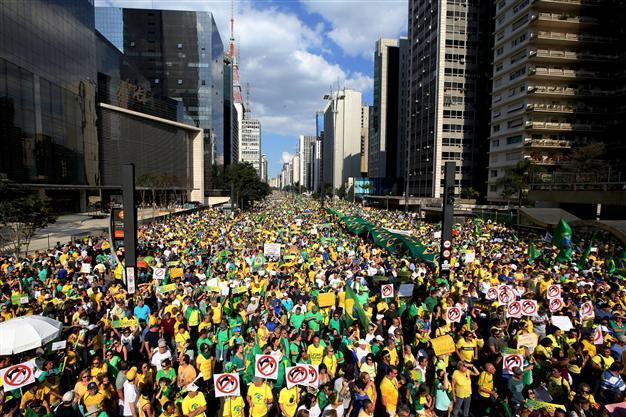Brazilians rage against president, corruption
SAO PAULO - Agence France-Presse

Demonstrators attend a protest against Brazil's President Dilma Rousseff, part of nationwide protests calling for her impeachment, at Paulista Avenue in Sao Paulo's financial centre, Brazil, August 16, 2015. REUTERS photo
Hundreds of thousands of protesters demanded Brazilian President Dilma Rousseff's resignation Aug. 16, blaming her and the leftist Workers' Party for runaway corruption and looming recession in Latin America's biggest country.
Crowds singing the national anthem and chanting "Dilma out!" paraded through the capital Brasilia, Rio de Janeiro, the country's largest city Sao Paulo and elsewhere across Brazil.
With some counts still incomplete, the G1 news site reported the latest police estimate for turnout to be 866,000 in dozens of cities and towns.
Organizers claimed a total of 1.9 million, including a million in Sao Paulo, where police counted only 350,000.
It was the third major anti-Rousseff protest this year, with 600,000 demonstrators taking to the streets in April and at least one million in March.
Less than a year into her second term, Rousseff is all but a lame duck, with the opposition considering controversial impeachment proceedings, and the country's elite caught in a vast embezzlement scandal centered on state-oil company Petrobras.
"We can't take this corruption any longer," said Rogerio Chequer, leader of the Vem Pra Rua (Go on the Streets) group, which helped organize the protests.
"If Congress has even a minimum of sense, it will decide on impeachment," he said at the Sao Paulo march, where many in the crowd wore the national football team's famous yellow shirt.
Rousseff, a former leftist guerrilla, has likened impeachment threats to a coup plot and insists she will not be forced from office.
Late Aug. 16, her spokesman Edinho Silva said "the government sees these demonstrations as part of normal democracy."
These are dark days for Brazil, which hosts the Summer Olympics in Rio next year.
The world's seventh-largest economy is sliding into recession, its credit rating reduced to near junk status.
Austerity measures have replaced the economic go-go years fueled by Chinese demand for commodities, while the ever-expanding Petrobras bribes and embezzlement probe is fueling a deep political crisis.
Prosecutors have brought charges against a who's who of Brazilian movers and shakers, including the billionaire head of the global construction company Odebrecht and a navy admiral once tasked with overseeing a secret nuclear program.
Rousseff's Workers' Party has been badly hit by the scandal and she has been tainted by association, even if not directly implicated.
Her party's treasurer was among those arrested in April.
The boisterous but peaceful crowds in towns and cities across the country pinned the blame on Rousseff, illustrating how Brazil's "Iron Lady" has become the least popular president in modern times, with single-digit ratings.
In Rio, there was a carnival-like mood. Samba music blasted, some protesters carried surfboards, others rode skateboards and many wore bikinis or bathing suits.
But protesters said their opposition to Rousseff and the Workers' Party is serious.
"They're looting Brazil, stealing everything," said Jorge Portugal, 63, who is retired from a job in marketing.
In Brasilia, retired engineer Elino Alves de Moraes, 77, called for Rousseff and her "gang" to be jailed.
At a rally in Belo Horizonte, the man who narrowly lost to Rousseff in her deeply divisive 2014 reelection, Aecio Neves, said the protests show that "Brazil has woken up."
But one of the most popular heroes for the opposition masses was not Neves or even a politician -- it was Sergio Moro, the 43-year-old judge handling the Petrobras cases.
"We are all Moro," placards read, and "Power to Sergio Moro!"
"Judge Moro is the country's salvation," said one Sao Paulo protester, Jose Freitas, 88.
Rousseff is struggling to stay afloat. The question is whether opponents dare drag her all the way down.
A key figure in her fragile governing coalition, House Speaker Eduardo Cunha, defected in July and is considering whether to pull the trigger on impeachment proceedings.
Analysts say Cunha -- under investigation for allegedly demanding a $5 million bribe -- is waiting to be sure that Congress would follow his lead, while Rousseff is racing to negotiate a truce.
One possible relief for her came earlier this week when she and Senate President Renan Calheiros -- under investigation in the Petrobras affair -- agreed to market-pleasing reforms.
The deal took Rousseff ever further from her socialist roots, but could help lure her right-wing opponents from the cliff edge.
"The middle classes want to kick her out of power in any way, but to what end?" asked Andre Perfeito, head economist at Gradual Investimentos.
"In business circles and the elite, there's an idea that it would be even worse if she left. It doesn't mean they're for Rousseff, but that getting rid of her would be even riskier."
